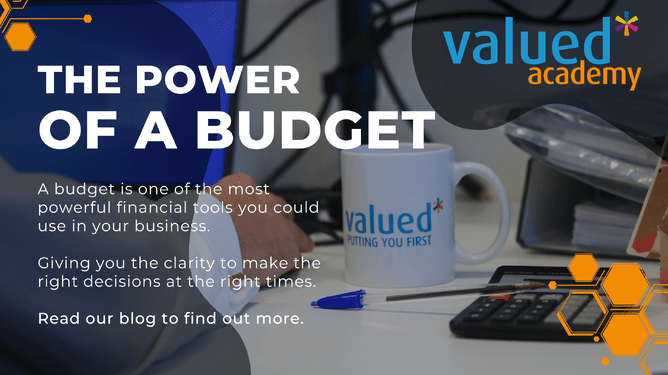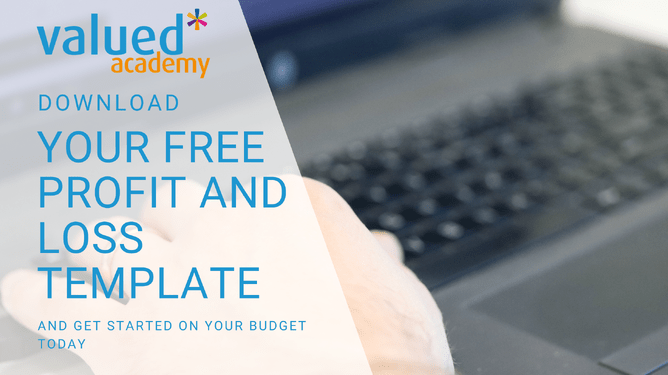Ok so we know this is the boring part of business, planning finances for each new year.
It’s not exciting and 9 times out of 10 many of us switch off because we find it overwhelming when we are busy, creatively limiting or, we just don’t entirely understand how to do it.
Don’t worry though. Today we are here to help you understand how and why to set a budget, and how to use it as a tool to scale your business effectively and efficiently.
So let’s start with the basics, what is a budget?
To put it simply a business budget is a plan for the next twelve months, coverring how and where you will spend your money. It also includes your predicted and desired income based on your goals for the business.
Sometimes you may be asked for a budget that covers three or even five years. Situations like this could be if you are applying for a business loan, looking for business funding or, even if you’re looking for an angel investment.
In most cases though, a twelve month budget is more realistic for forecasting in business and something that we can help you with here at Valued Academy.
Why do you need a yearly budget?
Setting a budget is important because it outlines your desired income, breaking down each product service, giving you the clarity to set targets that you can work towards and helps you track your progress throughout the financial year.
Not only that but it allows you to keep track of your expenditure, which is vital in business. Understanding your zero floor will stand you in good stead especially when heading into a recession. You may find that you’re able to immediately cut your costs, see where you may need to renegotiate prices with your suppliers, increase staff wages, or even afford that family holiday that you’ve been dreaming about.
A budget also highlights the weakest months in terms of cash flow. Not having the cash to pay your staff or buy in supplies can lead to issues in your business and it’s a trap you don’t want to fall into.
Forecasting gives the clarity to be able to make decisions such as, price increases or shortened payment terms with clients. If you can do this then you are able to increase your money pot at the right times, covering those slower months and investing where and when it’s required.
A budget is one of the most powerful decision making tools in business, giving us a much better understanding of our financials and increased chances of success.
Why not download our free spreadsheet?
The world is your oyster when it comes to budgeting software tools. If you use Xero then we suggest Fathom as an integration. This gives you forecasting, budgeting and cash flow tools so you can compare as you are planning.
If you're not sure if these software tools are right for you then book in with our software expert who can guide you through it all.
You can also, download our free budget spreadsheet to get started now and find out the true power of a budget as a financial tool.
How flexible is a budget?
We all know that life is unpredictable, things change and don’t always go as planned. Take Covid for example, a major crisis that every business in the nation has to plan and account for. When you have a budget in place you are able to go back to it and start making adjustments.
Maybe you’re wanting to work from home? You can check your budget to see if you have the funds for new equipment. You might even want to open a bricks and mortar store for your currently online business, your budget will highlight if you have the funds for rent, insurance, staff and refurbishments.
To put it simply, your budget is a tool that you review monthly. Allowing you twelve chances to succeed throughout the year, instead of the one chance you have when you await your accountant’s end of year review.
Don't forget to include seasonal trends!
Seasonal trends in demand for your services will be something that you’ve come across when trading. Accounting for these sensibly in your budget and use your cash flow to ensure you have what you need to cover your overheads during your lowest periods.
This gives you the space to make targets that stretch but don’t break your sales team.
What's the difference between a budget and cash flow?
Good question. So, a budget is a forecasting tool allowing you to detail what you hope to do with your profit and loss. Cash flow is a report that explains what is happening with your cash in the here and now.
Here’s an example:
Let’s say today you issue £10,000 worth of invoices and spend £3000 on costs leaving you with £7000 profit, all projected in your budget this month. Technically speaking you could say you’ve hit your target for the month, so give yourself a pat on the back!
But what happens if you give your clients 30 days credit?
This is where your cash flow comes in. Your cash flow will show you have £0 coming in this month as your clients won’t pay for 30 days but you still have those £3000 in expenses. Ultimately leaving you in a -£3000 loss for the month and not profit. If you don’t have an overdraft or the money in your account to cover those expenses you’re in a bit of pickle.
All too many business owners get into debt at this point, taking out loans and credit cards at unaffordable rates because they are not in a position to negotiate for that much needed cash injection.
Fast forward to next month, you’ve made £0 in sales however, all of your invoices have been paid so you’re in profit £7000 in your cash flow and budget. This allows you a much clearer view point on your finances so you can decide whether you can afford that extra pair of hands that you may so desperately need.
Now this is a very simplistic example just to highlight the power of both tools working together.
For your business it is likely to be a bit more complex.
Cash flow can also account for VAT and assets, whether that’s a new piece of equipment, a company car, desks, laptops, or even some machinery. These aren’t accounted for in your profit and loss budget so using the two simultaneously is crucial to achieving your goals.
Why can't I just add a % increase and be done with it?
You may have been trained to forecast a 5% increase in sales, cost and profit each year. But in reality this doesn’t really achieve anything, you end up in the same position you were last year, never truly growing or progressing.
If you create a budget alongside your cash flow you can actually work backwards with your goals. So you want to take that dream trip to the Maldives and you know it’s going to cost you £12,000. You then are able to understand that your business needs to produce £12,000 net profit this year. You could break this down to targets of £1000/month or £3000/four months extra profit during your key periods.
You can then see what your profits need to be based on last year’s overheads. Allowing you to potentially cut costs where appropriate, go back to your suppliers and renegotiate prices, review your client payment terms, or even raise your own prices.
By working backwards this dream can quickly become reality. It’s much easier to see where your opportunities are and the additional £12,000 gross profit sharply becomes more achievable.
So after all this, what's next?
- Start with your why. What do you really want to achieve from 2022?
- Use our handy template and layout your budget mimicking your last year of trading.
- Create targets on how you will achieve your monthly budgeted plans. Don’t forget to discuss this with your team, or maybe even give us a call here at Valued Academy. We can help and support you through the process.
- Follow our How to plan for your best business success in 2022 and work your goals into your budget from the bottom up. Don’t forget to take into account seasonality changes and any forecasted cash flow issues.
- Monitor your budget and cash flow each month. Review it accordingly with any unexpected dips or changes.
- Most importantly, watch your goals become a reality and enjoy the fruits of your labour.



